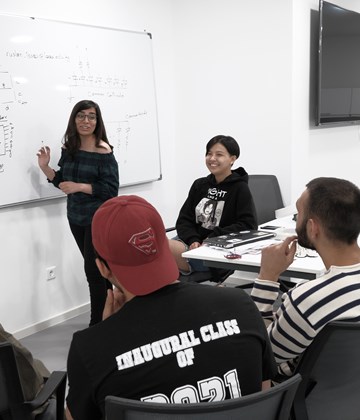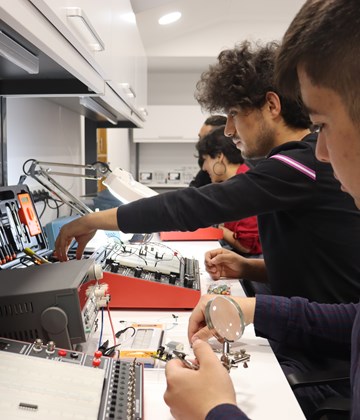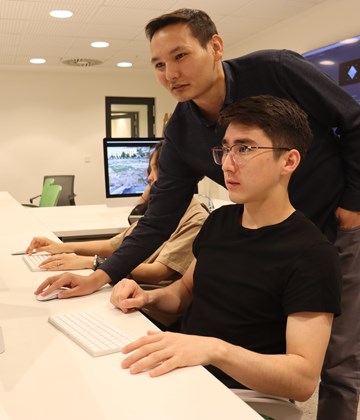
Freshman

Sophomore

Junior

Naryn campus, Kyrgyzstan
4 years
Curriculum developed in partnership with the University of Toronto
UCA’s Computer Science programme provides an innovative curriculum that equips students with a strong foundation in computational thinking, programming, and problem-solving, preparing them to shape the future of technology. Blending theory with hands-on experience, the curriculum covers key areas such as software development, data science, artificial intelligence, cybersecurity, blockchain, data structures and algorithms, computer architecture and networks, operating systems, and mobile app development.

Students can use state-of-the-art laboratories, including hardware, IoT, computer, and networking labs, to experiment with both hardware and software development. Graduates are well-prepared for dynamic careers in tech-driven industries or for advanced studies in specialised fields, making the programme a launchpad for tomorrow’s digital leaders.
Take courses in AI, Machine Learning, and Computer Vision not offered by other universities in the region.
The programme evolves with technological trends, offering students up-to-date knowledge in emerging areas.
Work alongside faculty on cutting-edge research projects that strengthen both academic depth and career readiness.
Gain skills and knowledge that are internationally relevant, opening pathways to work or further study abroad.
Benefit from internship opportunities and international exchange programmes that enhance real-world experience.
Open, assemble, and analyse the performance of components of a computer system, demonstrating knowledge of what each component does and how they fit together.
Demonstrate effective programming, data structures, and algorithm skills in one or more programming languages, including analysis techniques and their application to language creation, design, and processing.
Apply knowledge and practical skills in web development and design, together with the effective use of databases in application development.
Acquire machine learning and artificial intelligence techniques and understand their application in modern computing systems.
Demonstrate skills in linear algebra, differential and integral calculus, numerical methods, numerical algorithms, statistics, and optimization, and apply them to solving engineering problems using algorithmic procedures.
Apply security principles and practices to the environment, hardware, software, and human aspects of a system, and evaluate risks and threats in computer systems.
* Courses are subject to change.
Elective courses are offered to students in line with national requirements, and students can also choose free elective courses from another major.




"When I applied to UCA, many people wondered why I went to study in the remote town of Naryn. But I knew that the quality of education there would be at a high level and UCA exceeded all my expectations"
Iskender Berdiev, Computer Science, Alumnus, Class of 2021, Software Engineer at Google
"At UCA I saw real programming for the first time. Thanks to the broad computer science corriculum, we covered everything - software development, AI, mobile development, robotics and much more."
Ilhomjon Sidiqov, Computer Science, Alumnus, Class of 2025, Software Engineer at io.net.
"Pursuing my Bachelor's degree at UCA was unforgettable. I had a remarkable opportunity to study at both campuses and learnt about the diverse cultures of Kyrgyzstan and Tajikistan. Over the summer, I had a wonderful internship working at USAID in Monitoring and Evaluation. I was exposed to the real world, and learnt a lot about business ethics, data science, and data collection."
Ozar Aini, Computer Science, Alumnus, Class of 2021, ICT Assistant at OSCE

Applications are open for UCA's undergraduate programmes:
- BSc in Computer Science (offered in Naryn, Kyrgyzstan)
- BA in Communications and Media (offered in Naryn, Kyrgyzstan)
- BSc in Earth and Environmental Sciences (offered in Khorog, Tajikistan)
- BA in Global Economics (offered in Khorog, Tajikistan)
All programmes are taught in English and follow an international curriculum emphasizing analytical thinking, research, and community engagement. UCA students benefit from small class sizes, personalised academic support, and extensive internship and career development opportunities.
Application deadline: 14 February 2026